By Li Ni
QINGHAI, Northwest China — In July, Ma Jingui packed his car with canned food and camping equipment and drove his 800 sheep and 200 cattle along the Erga Highway, a road snaking up the Qilian Mountains in northwestern China. The 34-year-old stayed on the mountain peaks at more than 4,200 meters above sea level for over a month, waiting for the pastures farther down to replenish.
Ma has been making this trip, or some version of it, every summer since he was a child. “At first, there was no highway here — it was just a dirt road,” he says. “We’d be on horseback driving the sheep, with the cattle carrying the camping materials and dry fodder.”
This year, Ma took his son with him, making the 14-year-old the sixth generation of the Ma family to herd sheep in this corner of Qinghai province. The first was Ma’s great-great-grandfather, who migrated from neighboring Gansu province. But Ma thinks his child could be one of the last herders to make this journey.
“I don’t want to teach him anything, just give him a taste of how difficult it is,” says Ma. “Afterward, he can go back and study hard so he can change his destiny.”
Ma Jingui, whose family has herded sheep in Qinghai province for generations, explains how the creation of Mount Qilian National Park presents challenges for the local community.
Life is changing fast in Qilian. First came the new roads and modern transportation, which have disrupted the community’s traditional nomadic ways and brought an influx of tour buses and summer travelers. But it is the more recent government policies that have had the greatest impact.
In 2017, Gansu and Qinghai provinces announced plans to create a 50,000-square-kilometer national park, Mount Qilian National Park, to better protect local wildlife. The new park’s boundary cuts right through the middle of Bianma Village, Ma’s hometown.
“Villagers were always asking me what a national park was, and I couldn’t give them an answer,” says Ma, who serves as the village head. “The simplest explanation was to say that they’d have to stop hunting.”
Almost everyone in this remote region has experience dealing with wild animals. During the winter, a lack of food forces wolves down from the mountains, where they break into the herders’ homes and attack their sheep.
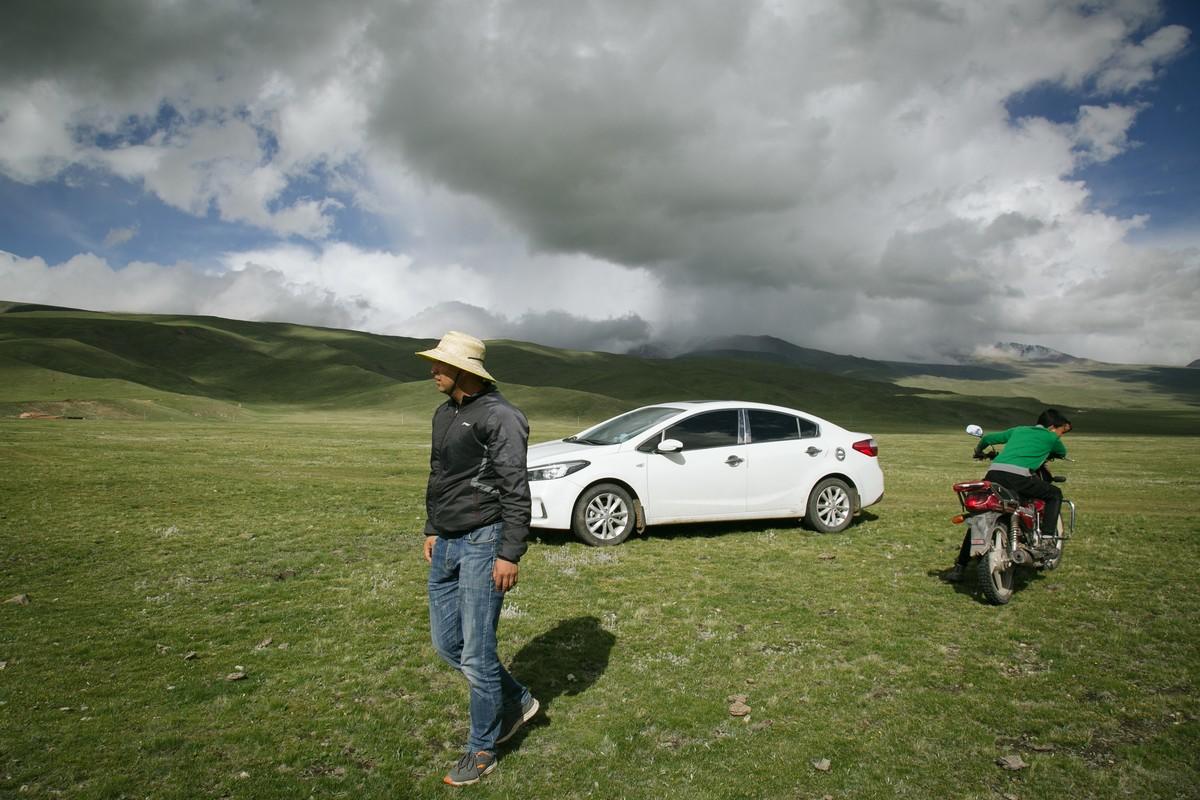
Ma Jingui (left) and his son drive their cattle and sheep to their winter pastures in Qilian County, Qinghai province, July 2019.
Ma remembers his grandparents joining with other villagers to form hunting parties to track down the wolves. But these groups were disbanded after the government enforced gun control regulations and began introducing wildlife conservation policies.
“There was a period when we weren’t allowed to kill the wolves at all — people just had to stand by and watch, then clean up the remains,” says Ma. “But later a compensation policy was introduced.”
This policy, introduced in 2012, allows farmers in Qinghai who have experienced losses from wolf and bear attacks to apply to the local forest rangers for compensation. They then receive partial compensation based on the current market price of cattle and sheep. But the compensation does not extend to other kinds of losses caused by the new national park — ones that are difficult to quantify.
As the ecology of the areas around Bianma has improved, wild bharal — or blue sheep — have started descending on the farmers’ pastures en masse. The bharal is a protected species in China. They cannot be killed, and they are difficult to keep away because they are highly agile. The farmers, meanwhile, have been forced to remove fences to allow wildlife to roam more freely. The result is that the bharal are left to graze freely on pasture intended for local sheep.
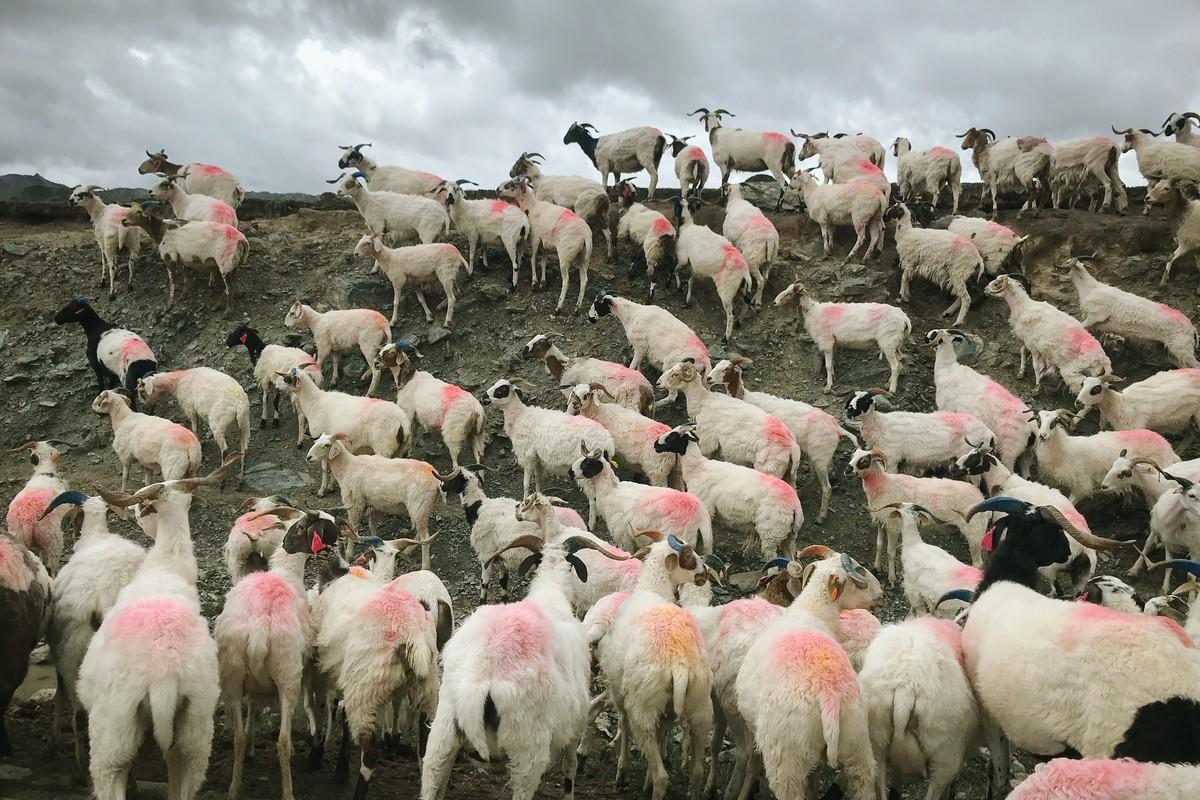
Sheep move to new pastures in Qilian County, Qinghai province, July 8, 2019.
“After the bharal leave, you won’t see any losses for a period of time, but our sheep have less grass to eat, and that affects their fertility,” says Ma, adding that 200 ewes that previously produced a litter of 150 lambs may now only produce 100.
Some herders have proposed simply allowing the government to purchase this part of the grasslands. But there is currently no policy to deal with these cases.
Zhang Yu, head of Mount Qilian National Park’s Qinghai provincial management office, explains that many villages across the province have encountered similar issues, but that it is difficult for officials to quantify the losses. They are working on a system to calculate ecological compensation, but questions still remain.
“Wild animals don’t know about boundary markers,” says Zhang. “They’re mobile and often wander outside. But how should villages outside the protected areas be compensated?”
As a makeshift solution, the government is giving the herders priority as the national park recruits a new team of rangers, according to Xiao Guoqing, an official at the Qinghai Forestry and Grassland Bureau.
But this may not be enough to satisfy the herders whose pasture land has been included inside the core protection area. Some villagers have asked Ma whether they could continue grazing their animals in the core area if they were willing to move their homes outside the protected zone. If grazing is banned altogether, they don’t know what they will do.
According to Zhang, the national park is looking to create more forest management positions inside the Qinghai area to help locals whose livelihoods have been affected.
There are currently 22 management stations in Qinghai, with 18 more to be added this year. The Hua’erdi Management Station in Tianjun County, at an altitude of 4,100 meters, experiences some of the most difficulties: The area is not yet connected to the electricity grid or mobile network.
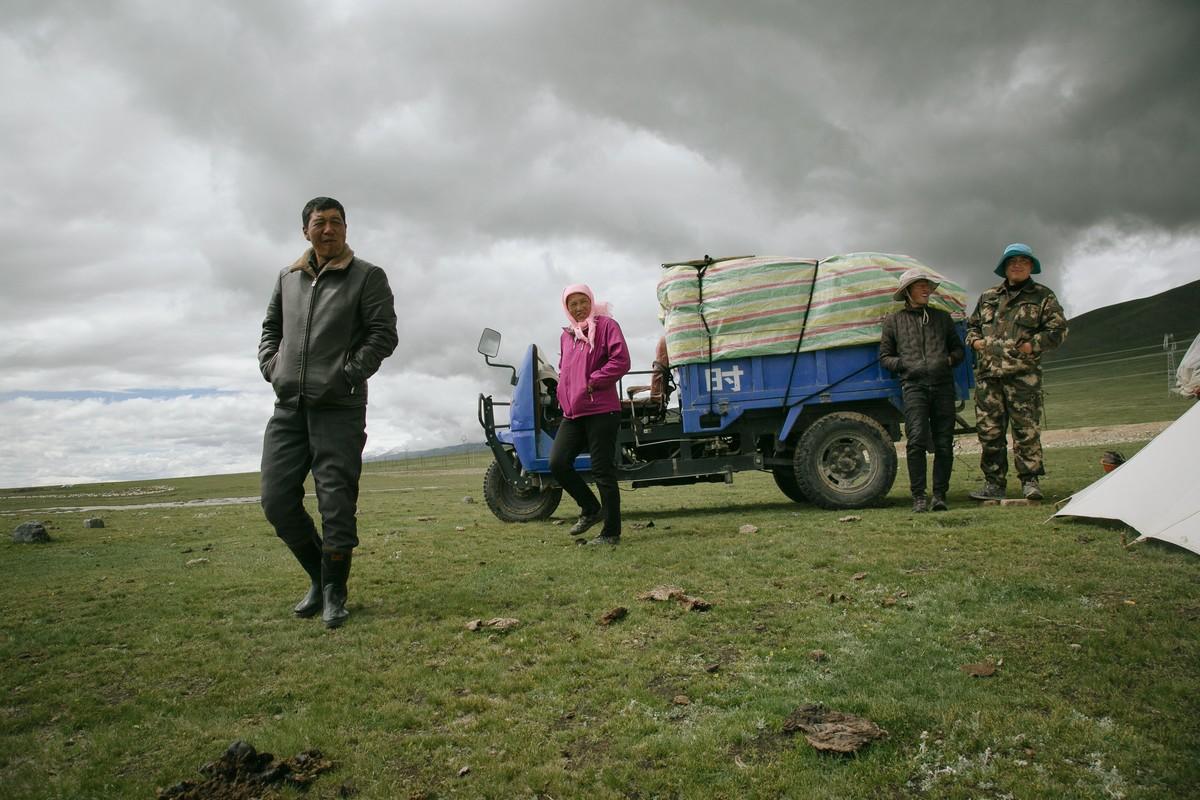
Herders pose for a photo with their belongings on their way to new pastures in Qilian County, Qinghai province, July 8, 2019.
Jia Hongjia, 33, has been the head of the Hua’erdi station for two years. The former herder spends his days patrolling the mountains by pickup truck, motorcycle, horse, or foot, depending on the terrain. The work is often treacherous, especially in winter.
During the past Lunar New Year in February, Jia’s station was hit by a huge snowstorm. His two colleagues went down the mountain to fetch supplies, but before they could return, the road was blocked. Jia was left stranded, with almost no food. “I thought this is it — my life ends here,” he says.
Luckily, he managed to contact a local herder by walkie-talkie, who walked more than two hours through the driving snow to rescue him.
Recruiting new rangers is not easy, according to Zhang. “You need to have a little education and some communication skills,” he says. “But in the mountains of Qinghai, anyone with these qualities can often find other ways to make a living.”
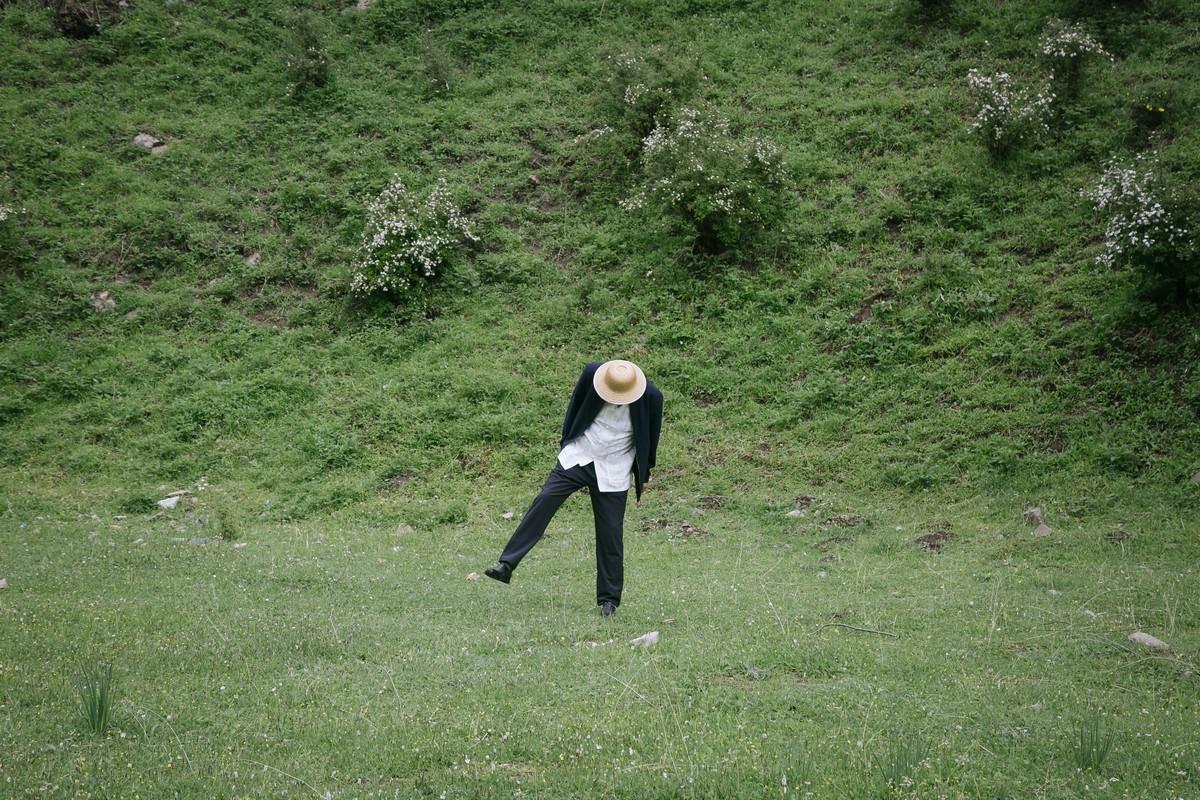
A ranger takes a break in Qilian County, Qinghai province, July 2019.
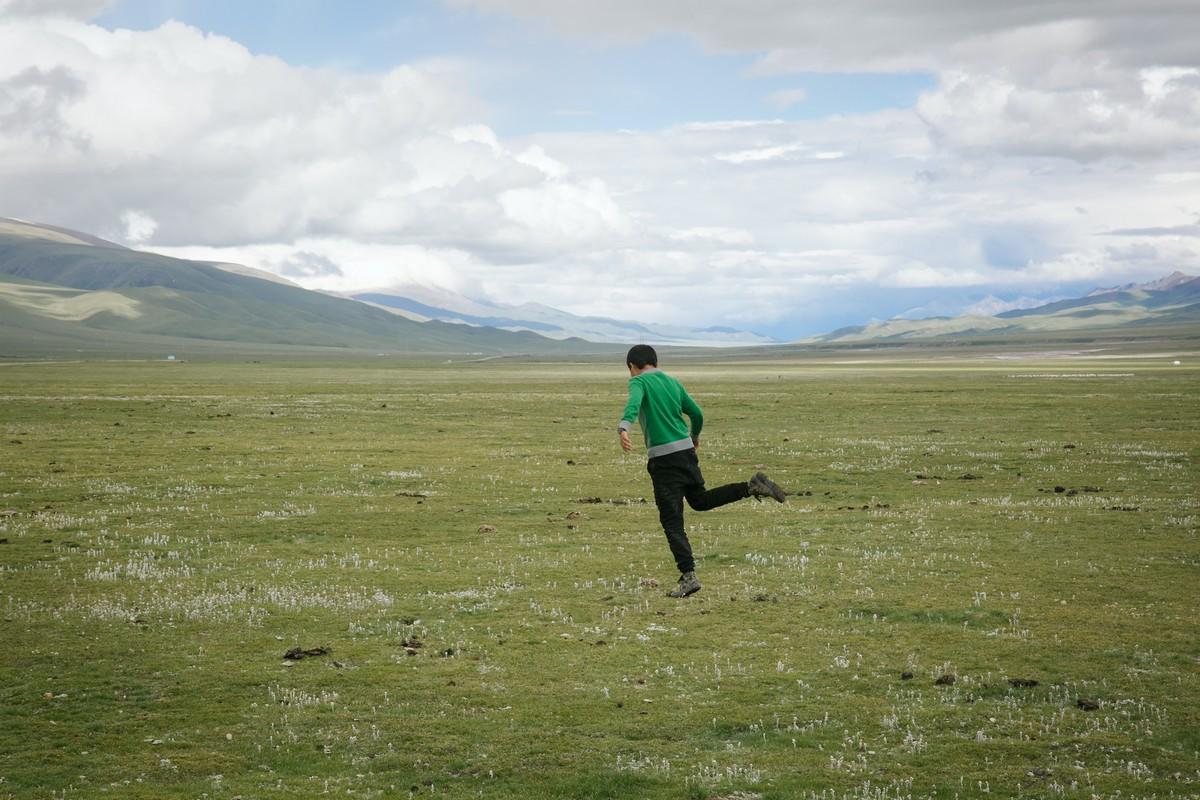
Ma Jingui’s 14-year-old son plays on the grasslands in Qilian County, Qinghai province, July 2019.
Since 2014, the government has been stepping up poverty alleviation campaigns in Qilian County, and a growing tourism industry is also transforming the local economy. Many locals who used to work on “fodder teams” growing crops for use as fodder have left to find new jobs.
Years of working odd jobs to make ends meet helped these workers develop the skills they need to find work in the economy, according to Ma. They are now the rangers, parking lot attendants, supermarket cashiers, and ticket sellers who keep the national park running. But for the herders, who have spent their entire lives raising livestock, moving into the service industry feels like a huge leap.
“National parks in the United States are wildernesses — Native Americans were driven off the land and even killed in the early years — but we’ve had people settled here since the very beginning, people who’ve lived her for generations,” says Zhang. “Many of them haven’t received a modern education. It’s possible that they don’t have the ability to live in cities and towns.”